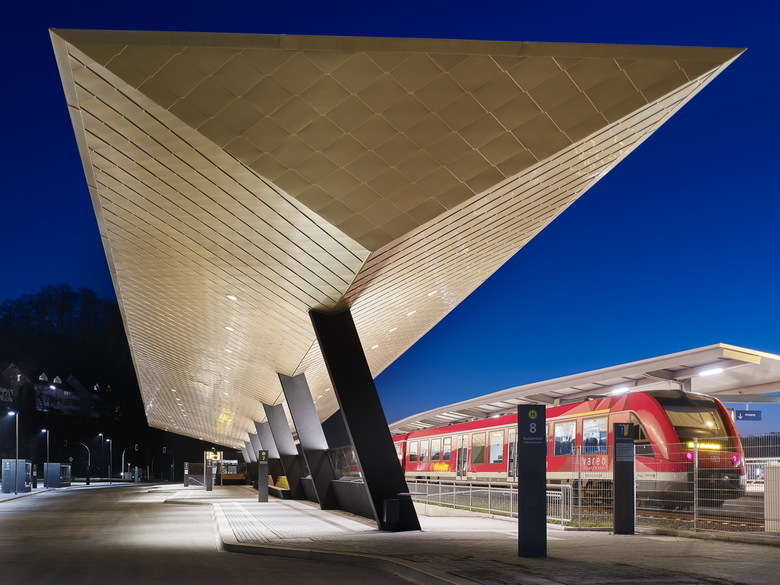Golden Edge
John Hill, Thomas Geuder
11. avril 2016
The new bus station was created as part of Local 2010 urban development plan in Gummersbach as a component in the restructuring of the 18-hectare former Steinmüller area. (Photo: Lukas Roth)
"A warmly glowing, floating metal sculpture" is how the architects at pape + pape describe the new bus station they designed for Gummersbach, Germany. Sited by the train station, the new structure creates a striking image at the entrance to the country town.
For more than a century Gummersbach was home to L. & C. Steinmüller, which founded a a tube and steam boiler factory in the city in 1874. Gummersbach and Steinmüller were inextricably linked until the early 2000s, when the latter went bankrupt and moved its operations elsewhere under new ownership. Although a great loss for the city, the situation was also a great opportunity: Gummersbach bought the 18-hectare brownfield site, demolished most of the buildings, and erected a shopping center, sports arena, technical college and park as part of the Local 2010 urban develpment plan. The bus station, located on the eastern edge of the site, strengthens connections between regional train and local bus transportation.
The large roof comfortably shelters people waiting for buses and guarantees a dry entry into the buses. (Photo: Lukas Roth)
Gummersbach's old train station was demolished as part of the plan, and the bus station was relocated here. For this new location pape + pape designed a 130-meter-long, 10-to-25-meter-wide roof whose form and materials are a worthy prelude to those entering the city. It follows the gentle curve of the train platform and consists of a polygonal folded form inspired by the broken structure of rocks in the area. Aluminum bronze shingles on the underside of the roof shine golden, an effect strengthened by the darkness of the concrete base and the angled concrete columns supporting the roof.
At night the roof body is staged as a light sculpture. (Photo: Lukas Roth)
At night the golden shingles really glow, thanks to Lichtwerke's lighting design. According to managing director Stefan Hofmann, their design addresses security concerns, which are a top priority in projects like this, while also reinforcing the qualities of the architectural design. The former comes in the form of powerful direct lights set into the roof that illuminate the platforms, while the latter involves indirect uplights that highlights the gold shingles. The indirect lighting is made up of LED light bands (Insta Elektro's Instalight LEDLUX LH und LS) that are installed atop the glass walls that span from column to column and shield the adjacent wood benches from the wind. These benches give the passengers a secure, sheltered space to wait for their buses, yet one that receives some drama from the glowing metal sculpture overhead.
Lighting of the roof is hidden in the linear light strips above the angled glass walls behind the benches. (Photo: Lukas Roth)
The futuristic 130 meter-long roof forms the long-lost architectural entry into the city of Gummersbach. (Photo: Lukas Roth)
Site plan (Drawing: pape + pape)
Floor plan (Drawing: pape + pape)
Cross section (Drawing: pape + pape)
Roof and downlight details (Drawing: pape + pape)
Construction site seen from the train platform: The supporting structure was easily built as a steel skeleton. (Photo: pape + pape)
The glass walls rise obliquely from the colored precast concrete elements. (Photo: Lukas Roth)
A version of this story was previously published as "Golden Kante" on German-Architects.
PROJECT DETAILS
Project
Bus Station Gummersbach
Gummersbach, Germany
Architecture
pape pape + architekten
Kassel, Germany
Project Team: Thomas Zinn, Janus Kühmstedt
Lighting Design
Lichtwerke GmbH
Prof. Stefan Hofmann
Cologne, Germany
Manufacturer
Insta Elektro GmbH
Lüdenscheid, Germany
Product
Instalight LEDLUX LH and LS
Other Manufacturers
Downlights: we-ef, Bispingen
Precast Concrete: Anton Schick, Bad Kissingen
Shingles: Böhme Systems, Dresden
Uplights: Insta, Lüdenscheid
Landscape Architecture
greenbox landschaftsarchitekten
Cologne, Germany
Structural Engineering
Reitz and Pristl Ingenieurgesellschaft
Kassel, Germany
Roof Surface Area
Approx. 2,000 m²
Gross Floor Area
Approx. 100 m²
Construction
2015
Photography
Lukas Roth










